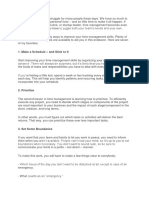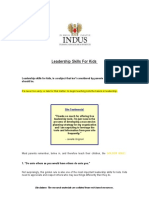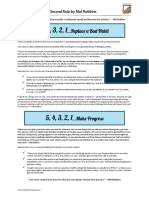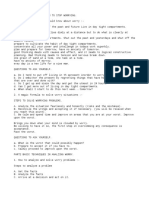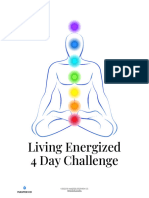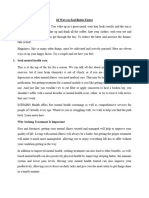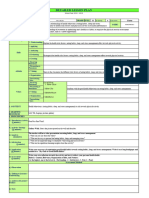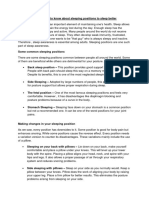How to Be Happy: 25
Habits to Add to Your
Routine
1. Smile
You tend to smile when you’re happy. But it’s actually a two-way street.
We smile because we’re happy, and smiling causes the brain to release
dopamine, which makes us happier.
That doesn’t mean you have to go around with a fake smile plastered on your
face all the time. But the next time you find yourself feeling low, crack a smile
and see what happens. Or try starting each morning by smiling at yourself in
the mirror.
2. Exercise
Exercise isn’t just for your body. Regular exercise can help to reduce stress,
feelings of anxiety, and symptoms of depression while boosting self-esteem
and happiness.
Even a small amount of physical activity can make a difference. You don’t
have to train for a triathlon or scale a cliff — unless that’s what makes you
happy, of course.
�The trick is not to overexert. If you suddenly throw yourself into a strenuous
routine, you’ll probably just end up frustrated (and sore).
Consider these exercise starters:
Take a walk around the block every night after dinner.
Sign up for a beginner’s class in yoga or tai chi.
Start your day with 5 minutes of stretching. Here’s a set of stretches to
get you started.
Remind yourself of any fun activities you once enjoyed, but that have fallen by
the wayside. Or activities you always wanted to try, such as golf, bowling, or
dancing.
3. Get plenty of sleep
No matter how much modern society steers us toward less sleep, we know
that adequate sleep is vitalTrusted Source to good health, brain function, and
emotional well-being.
Most adults need about 7 or 8 hours of sleep every night. If you find yourself
fighting the urge to nap during the day or just generally feel like you’re in a
fog, your body may be telling you it needs more rest.
Here are a few tips to help you build a better sleep routine:
Write down how many hours of sleep you get each night and how rested
you feel. After a week, you should have a better idea how you’re doing.
Go to bed and wake up at the same time every day, including
weekends.
� Reserve the hour before bed as quiet time. Take a bath, read, or do
something relaxing. Avoid heavy eating and drinking.
Keep your bedroom dark, cool, and quiet.
Invest in some good bedding.
If you have to take a nap, try to limit it to 20 minutes.
If you consistently have problems sleeping, talk to your doctor. You may have
a sleep disorder requiring treatment.
4. Eat with mood in mind
You already know that food choices have an impact on your overall physical
health. But some foods can also affect your state of mind.
For example:
Carbohydrates release serotonin, a “feel good” hormone. Just keep
simple carbs — foods high in sugar and starch — to a minimum,
because that energy surge is short and you’ll crash. Complex carbs,
such as vegetables, beans, and whole grains, are better.
Lean meat, poultry, legumes, and dairy are high in protein. These
foods release dopamine and norepinephrine, which boost energy and
concentration.
Highly processed or deep-fried foods tend to leave you feeling down.
So will skipping meals.
Start by making one better food choice each day.
For example, swap a big, sweet breakfast pastry for some Greek yogurt with
fruit. You’ll still satisfy your sweet tooth, and the protein will help you avoid a
mid-morning energy crash. Try adding in a new food swap each week.
�5. Be grateful
Simply being grateful can give your mood a big boost, among other benefits.
For example, a recent two-part study found that practicing gratitude can have
a significant impact on feelings of hope and happiness.
Start each day by acknowledging one thing you’re grateful for. You can do this
while you’re brushing your teeth or just waiting for that snoozed alarm to go
off.
As you go about your day, try to keep an eye out for pleasant things in your
life. They can be big things, such as knowing that someone loves you or
getting a well-deserved promotion.
But they can also be little things, such as a co-worker who offered you a cup
of coffee or the neighbor who waved to you. Maybe even just the warmth of
the sun on your skin.
With a little practice, you may even become more aware of all the positive
things around you.






